

Personal Excellence presented by HR.com February 2023 1 Submit Your Articles 14 09 18 24 Dogs Come Into Our Lives To Teach Us About Love - Dr. Beverly Kaye, BevKaye&Co Four Ways To Improve Decision-Making Even When You’re Stressed - Dr. Jim Loehr, Human Performance Institute, and Dr. Sheila Ohlsson Walker, Tufts University Careers: First Discover What You’re Good At - Christopher Volk, Author, Business Leader & Investor FEBRUARY 2023 • Vol. 28 • No. 02 (ISSN 2564-1948) How To Elevate Your Career This Year - Heather Gough, BPP SHArpEn YOUr SAW WITH SELF-LOvE AnD SELF-CArE - Roberta Hughes, Founder and Lead Instructor, PeaceFull Living
There


Articles
How To Build Trust And Expertise With After Action Reviews (AARs) Three common mistakes and how to avoid them - Jake Mazulewicz, Ph.D., Founder & Owner, JMA Human Reliability Strategies 16 Have A Trust Deficit? Here’s how to build and keep organizational trust - Howard M Guttman, Principal, Guttman Development Strategies
How To Help Your Employees Deal With Depression
11
20
are instances when the Winter Blues or a “new year slump” is something more - Dr. Doug Newton, Chief Medical Officer, SonderMind
Commit To Refiring Your Life, Not Retiring From Life
to do what you love - Jim Stovall, President, Narrative Television Network
A Founder’s Big Four For Building A Team
of the common pitfalls - Anthony Millin, Founder and Chair, NEXT Sharpen Your Saw With Self-Love and Self-Care A few ideas for practices that will help you raise your Self-Love KPIs - Roberta Hughes, Founder and Lead Instructor, PeaceFull Living 06
27
Continue
29
Understanding
IOn the Cover
n DEX Personal Excellence FEBRUARY 2023 Vol.28 No.02 (ISSN 2564-1948)
Dogs Come Into Our Lives To Teach Us About Love
Always be there for someone especially when it’s needed the most
- Dr. Beverly Kaye, Founder
and
CEO, BevKaye&Co
How To Elevate Your Career This Year


Find flexible options that work for you
- Heather Gough, Head Of Digital Product Management, BPP
Four Ways To Improve Decision-Making Even When You’re Stressed

Rise above the immediate stresses of the moment
- Dr. Jim Loehr, Human Performance Institute, and Dr. Sheila Ohlsson Walker, Tufts University
Careers: First Discover What You’re Good At Passion and purpose will follow
 - Christopher Volk, Veteran Executive, Entrepreneur, Business Leader & Investor
- Christopher Volk, Veteran Executive, Entrepreneur, Business Leader & Investor
INDEX Top Picks 09 14 18 24
Editorial Purpose
Our mission is to promote personal and professional development based on constructive values, sound ethics, and timeless principles.
Excellence Publications
Debbie McGrath CEO, HR.com - Publisher
Sue Kelley Director (Product, Marketing, and Research)

Babitha Balakrishnan and Deepa Damodaran Excellence Publications Managers and Editors
Personal Excellence Team
Babitha Balakrishnan Editor
Chinnavel Design and Layout (Digital Magazine)
Vibha Kini Magazine (Online Version)
Submissions & Correspondence
Please send any correspondence, articles, letters to the editor, and requests to reprint, republish, or excerpt articles to ePubEditors@hr.com
For customer service, or information on products and services, call 1-877-472-6648
Debbie Mcgrath Publisher, HR.com
Babitha Balakrishnan Editor, Personal Excellence

Do What You Love and Love What You Do
February, the month when love is celebrated, emphasizes the importance of love in our lives. It is not just about valentines and sweethearts but also about self-love and self-care, nurturing relationships with family and friends.
What does it mean to love yourself? Will doing what you love, make you happier?
Self-love is the fuel for emotional intelligence. The good news is that training your self-love skillset can be quite simple. The bad news is that there isn’t a crash course in self-love. Similar to your job performance, you can also measure your self-love performance using KPIs. Learn how to do that in Roberta Hughes’s article, Sharpen Your Saw With Self-Love and Self-Care.
Whether you have a dog or just know a dog, dogs are connected to our work lives in more ways than we think. Dr. Beverly Kaye’s article, Dogs Come Into Our Lives To Teach Us About Love, shares what dogs can teach us about work and love.
Are you facing a big decision, but feeling too stressed to make it? In their article, Four Ways To Improve DecisionMaking Even When You’re Stressed,
Dr. Jim Loehr and Dr. Sheila Ohlsson Walker, highlight ways to overcome stress so that you can make thoughtful, clear-eyed decisions that work for you.
Finding things you’re good at is hard work. Getting great at them is an accomplishment. Being able to take joy in that achievement and the thrill of creative effort is the essence of career success. In his article, Careers: First Discover What You’re Good At, Christopher Volk talks about job satisfaction, passion and personal happiness.
In brief, this edition of Personal Excellence is all about love, personal and professional growth and tips to find happiness in your life. While spending time for/with others, don’t forget about yourself. Love yourself a little more and discover yourself all at once.
We hope you gain insights and new ideas from reading all the articles in this edition and get back to us with your valuable feedback and suggestions.
Happy Reading!
Disclaimer: The views, information, or opinions expressed in the Excellence ePublications are solely those of the authors and do not necessarily represent those of HR.com and its employees. Under no circumstances shall HR.com or its partners or affiliates be responsible or liable for any indirect or incidental damages arising out of these opinions and content.
EDITOr’S nOTE
OR
©
of
may be
in any form
credited.
For Advertising Opportunities, email: sales@hr.com Copyright
2023 HR.com. No part
this publication
reproduced or transmitted
without written permission from the publisher. Quotations must be
Excellence
is published monthly by HR.com Limited,
Personal
(ISSN 2564-1948)
56 Malone Road, Jacksons Point, Ontario L0E 1L0 Internet Address: www.hr.com
Subscribe now for $99 / year And get this magazine delivered to your inbox every month Become a Member Today to get it FREE! SIGN UP Write to the Editor at ePubEditors@hr.com
In a world of unparalleled challenges (global pandemic, racial injustice, political rivalry, digital 4.0, emotional malaise), uncertainty reigns. Finding opportunity in this context requires harnessing uncertainty and harnessing starts with reliable, valid, timely, and useful information. The Excellence publications are a superb source of such information. The authors provide insights with impact that will guide thought and action.

Excellence publications are my ‘go-to’ resource for contemporary and actionable information to improve leadership, engagement, results, and retention. Each edition offers rich and diverse perspectives for improving the employee experience and the workplace in general.


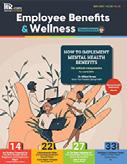





I regularly read and contribute to Leadership Excellence and Talent Management Excellence. I use many of the articles I read to augment my own presentations and I often share the articles with my clients. They are always quick, right on target for the latest issues in my field, and appreciated by my clients. If you want to stay up to date on the latest HR trends, choose a few of the different issues from the Excellence series of publications.






 Dave Ulrich
Rensis Likert Professor, Ross School of Business, University of Michigan Partner, The RBL Group
Julie Winkle Giulioni Author, Virtual /Live Keynote Presenter, Inc.’s Top 100 Leadership Speakers
Dr. Beverly Kaye CEO, BevKaye&Co.
Dave Ulrich
Rensis Likert Professor, Ross School of Business, University of Michigan Partner, The RBL Group
Julie Winkle Giulioni Author, Virtual /Live Keynote Presenter, Inc.’s Top 100 Leadership Speakers
Dr. Beverly Kaye CEO, BevKaye&Co.
WHY EXCELLENCE PUBLICATIONS?
We’re eager to hear your feedback on our magazines. Let us know your thoughts at ePubEditors@hr.com
Sharpen Your Saw With Self-Love and Self-Care
A few ideas for practices that will help you raise your self-love KpIs
By Roberta Hughes, PeaceFull Living
Have you heard the story of the two woodcutters?
Two woodcutters were challenged to a competition to see who could cut down the most wood in a day. They were matched in skill, and fitness, and were considered experts in their craft. On competition day, they started chopping wood at the same time. One woodcutter stopped every hour. The other woodcutter heard the silence, which inspired thoughts of an opponent who was quitting and tiring out. Victory seemed unquestionable. At the end of the day, when the judges measured the amount of wood
for each competitor, the woodcutter who stopped every hour had significantly more wood stacked and perfectly cut. As it turns out, the woodcutter who stopped every hour took the time to sharpen their saw.
So, how exactly do we sharpen our saw as leaders?
More likely than not, your business skills are exceptional. You are skilled in your craft and were selected to lead because of your expertise and

Personal Excellence presented by HR.com February 2023 6 Submit Your Articles
COvEr ArTICLE
knowledge. While excellence and performance are a main part of your leadership role, they are also limited resources dependent on fuel and inspiration. Fueling your resources to maintain high standards of leadership requires an investment in self-love and self-care practices that nourish you from the inside out. In other words, as a leader, sharpening your saw means taking the time to pause, rest and restore so you can show up as the excellent leader you aim to be for your team.
What is Self-Love?
Self-love is the fuel for emotional intelligence. It is your wellspring for creativity and connection, and the main resource from which you gain authenticity. The good news is that training your self-love skillset can be quite simple. The bad news is that there isn’t a crash course in self-love. You won’t be able to go to a daylong training and leave with a perfect score. Self-love doesn’t work that way. Instead, self-love requires consistency and practice. Similar to your job performance, you can also measure your self-love performance using KPIs.
What percentage of the time would you say the following statements are true?
● I sleep well and wake up feeling rested.
● I look forward to working with my team members.
● I am rarely sick.
● I am able to handle transitions and change.
● I am resilient in situations that bring conflict and stress.
● I am able to communicate with my team and create healthy working relationships.
● I feel emotionally stable.
● I bring empathy and compassion to my team.
● I feel connected and engaged with my team.
● My team members rarely complain and perform at their optimal level.
As a leader, you likely want your KPIs to be as high as possible. As a human being, it’s important to investigate ways to gain clarity around the source of low KPIs, so you can grow and improve your numbers.
Here are a few ideas for practices that will help you raise your Self-Love KPIs:
Mindfulness Meditation
A Harvard study by Matthew A. Killingsworth and Daniel T. Gilbert reveals that the mind wanders 47% of the time.
Mindfulness Meditation teaches your brain how to focus and come back to the present moment. With practice, you gain the ability to be right here, right now, regardless of conditions. The benefit of being in the present moment is that we find ourselves more at ease and less reactive. These tools allow us to be patient in handling situations that might be more stressful without mindfulness.
Breathing
The breath is a tool we can use to inspire mindfulness. When your mind is connected to the breath, thoughts subside allowing you to feel more focused and less distracted. In stressful situations, simply taking three deep breaths can regulate your nervous system so you feel less overwhelmed and more able to manage the situation.
Yoga
“…to really understand Yin Yoga, or any form of yoga, one must experience it. Reading about yoga is like reading a menu when you are hungry: interesting, maybe even mouthwatering, but until you actually partake of what you are seeing, your need will not be quenched.” -
Bernie Clark
Yoga is a movement practice that creates a union between mind, body, and spirit. It offers an opportunity to release physical tension, and in turn, helps us manage stress. With practice, we feel better in our bodies and our mood is elevated, allowing us to be more open and available to listen and offer support for others.
Personal Excellence presented by HR.com February 2023 7 Submit Your Articles
Sharpen Your Saw With Self-Love and Self-Care
pilates
Pilates, a movement practice created by Joseph Pilates, focuses on improving a person’s physical fitness using six principles: centering, concentration, control, precision, breathing, and flowing movement. The six Pilates principles, when practiced regularly, can transform your relationship with others. By bringing the Pilates principles into your leadership role, you will find that you lead with more energy and are more resilient to challenges brought to you by team members.
So How Do I Begin to practice Self Love?
Now that you have an understanding of Self Love, you may be wondering where to begin. While it may seem a bit daunting, I assure you it can be quite simple by using self-care practices that you enjoy.
Self-care practices harmonize your body, mind, and spirit so that you feel better, sleep better, and perform at the level you desire. The key to self-care is in choosing the practices that work for you. When you find things you enjoy and things that work, link two or more together to create a routine and plug it into your day. The consistency of practicing the same routine over time will help regulate your nervous system so you become more at ease and feel good. When you feel good, you will lead from a place where your talents and skills shine through.
Need help finding self-care practices that might work for you? Here are a few simple practices to try out:

● Take a Zen Break - A Zen Break is a short, guided Mindfulness Meditation designed to rejuvenate your focus and energy.
● Get Outside - Time in nature calms the nervous system through exposure to natural light, vitamin D, and fresh air.
● Plug White Space into Your Calendar - A cluttered calendar is like working with a dull saw. Sharpen your saw by scheduling personal downtime for at least five minutes a few times a day to improve your productivity.
● Practice Gratitude - Negative thoughts prevent you from leading with purpose. Your team members will feel your stress. Try shifting your mindset in stressful times by focusing on gratitude for each team member and the contribution they bring to productivity.
● Stand Up Each Hour - When your body is sedentary, your energy will drop. As Joseph Pilates often said, “movement heals.” Get up and walk or stand each hour to revitalize your energy.
Now it’s time to practice. When you take out your calendar to schedule your next meeting, try adding one self-care practice to your schedule. Give yourself at least a week to practice and see how it works for you. When you find a tool that works, keep it then add another. Find your formula and build your routine so you can lead with the sharpest tool in your toolbox. After four weeks, go back and measure those KPIs then share the process with your team.
Peaceful living expert, Roberta Hughes is the Founder and lead instructor at PeaceFull Living, a boutique hybrid studio that conveys delicate and personalized instruction through customized Pilates, Meditation, and Yoga classes. PeaceFull Living grants clients a way to filter out life’s pressures through a delicate and highly personalized approach through its live streams and on-demand classes.
Would you like to comment?

Personal Excellence presented by HR.com February 2023 8 Submit Your Articles
Sharpen Your Saw With Self-Love and Self-Care
Dogs Come Into Our Lives To Teach Us About Love
Always be there for someone especially when it’s needed the most
 By Dr. Beverly Kaye, BevKaye&Co.
By Dr. Beverly Kaye, BevKaye&Co.
“If you are familiar with my work, you know that the word LOVE plays a big part in who I am and what I do. When someone mentioned about National Dog Day, I immediately thought about the question what has your dog taught you about Love? My daughters, who are in the dog training and boarding business said, “Every day is National Dog Day for us!” And it made me think that our dogs probably all have that same feeling!
So, as a good researcher, I decided to go to friends and the folks I work with every day and ask that same question. My next job is to make this into a checklist for managers…so they can rate themselves on these same elements!! Watch for that!
What Can Dogs Teach Us About Work?
Waking up with our dogs is the best kind of groundhog’s day. Our dogs are constantly teaching us about love.
Have you ever felt like you were “working like a dog?” Do dogs even work that much?? Mine sure don’t! Working remotely during the pandemic has spoiled my dogs since they have access to me 24/7. Whether you have a dog or just know a dog, dogs are connected to our work lives in more ways than we think. When working like a dog, don’t forget to play like one too.
Remember to go on walks- take yourself on a walk if no one wants to go with you! Thankfully, you don’t need anyone to hold your leash.
Personal Excellence presented by HR.com February 2023 9 Submit Your Articles
Top pick
● Don’t be afraid to show affection
● If you care about someone, don’t leave them any doubts.
● Forgive freely and instantly
● Never let a friend cry alone
● All you need is love
● Be sure to welcome your workmates warmly each day
● Check in on them if it looks like they need some help
● Start the day with stretching and play
● Communicate what you need clearly
● Take breaks to connect throughout the day
● Naps are nourishing, make room for wellness breaks
● Make new friends without reservation / Connect with others with openness, be interested
● Remember your enthusiasm is catching
● We need each other and we need to look out for each other
● If we take a moment together to reenergize, it can make all the difference
● Communication is everything…work at it regularly
● Take time to know and understand each other
● Watch out for each other, pay attention and be ready to help when others need you
From a Dog’s point of view:
● We’re excited for our routines. We love to get out of bed, our first movements of this brand-new day. We open the door to the backyard and feel the sunshine…and we know breakfast is coming! It’s the same breakfast we’ve had every day but somehow, it’s even more delicious than it was yesterday.
● Pee on everything you can…when outside of course
● Make sure you hug and cuddle regularly – a few wet licks are a good think
● Yell hello (bark) when you see someone you might know or might want to know
● If you want to play ball, drop it in front of someone with hands and sit there looking really cute
● If the food sucks, don’t eat it. They will give you something better
Dogs come into our lives to teach us about love, and they depart to teach us about loss. Always be there for someone especially when it’s needed the most. Learn from one another and push yourself to always be your best even when it seems like it’s too far to reach. Live each day to its fullest even when it’s a bad one…there’s always someone there to pick you back up. A dog is the only thing that loves you more than he loves himself. They may not be in our whole lives, but we are all of theirs. Be kind, true, and listen to others. You never know when someone might need it.
Dr. Beverly Kaye is a best-selling author, dynamic speaker and internationally recognized authority on career development, employee engagement and retention. Since her entrepreneurial debut as CEO of Career Systems International (CSI) forty years ago, Bev has used her incisive and inventive thinking to help organizations reduce the costs of talent loss and foster cultures of support. She has refreshed the thinking and behaviors of countless business leaders – as a guide on the side and sage on the stage. She is the Founder and CEO of BevKaye&Co
Would you like to comment?

Personal Excellence presented by HR.com February 2023 10 Submit Your Articles
Dogs Come Into Our Lives To Teach Us About Love
How To Build Trust And Expertise With After Action reviews (AArs)
Three common mistakes and how to avoid them
By Jake Mazulewicz, Ph.D., JMA Human Reliability Strategies
Do you lead your team to learn primarily from successes or from failures?
Many leaders argue that their teams are just too busy to spend time discussing why a successful project went well. They just wrap up fast, then dive into the next project.

So, the unspoken insights and unwritten lessons learned from that project rarely ever get shared or discussed. Often, they just get forgotten in the frenzy of working project after project.
Would you hire an engineer to build you a bridge if all that engineer ever studied was how bridges collapse?
Personal Excellence presented by HR.com February 2023 11 Submit Your Articles
Would you hire a recruiter to find you a job if all that recruiter ever studied was how people get fired?
The best leaders help their teams learn regularly from their successes, not just occasionally from their failures.
But learning from success happens automatically… doesn’t it?
After Action review (AAr)
Soldiers perform complex, dynamic, often dangerous missions. And they want to learn as much as they can from each one. In the 1980s, leaders in the US Army realized that they needed a practical way to help soldiers share the unspoken insights and unwritten lessons they learned from their missions. They realized that sharing tribal knowledge and applying tacit skills were key to winning wars. And since it was the Army, they developed a process -- a non-punitive, semi-structured, post-job team debrief called an After Action Review (AAR).
After Action Reviews have proven so wildly effective that every branch of the military now uses them. And for some units like flight crews and Special
Operations Forces, AARs are almost a religion. They’ve been called, “one of the most successful organizational learning methods yet devised.”
The process of leading a basic AAR is simple. Soon after your team completes a project, gather them in a private space for about 30 minutes, and ask these four questions:

1. What did we set out to do?
2. What did we actually do?
3. How did it turn out the way it did?
4. What will we do differently next time?
Why Use These Questions?
Have you ever had a discussion degenerate into a fact-free “war of opinions”? That’s the fate you’ll suffer if you start a debrief by asking for opinions. True, questions 3 and 4 are subjective and do indeed ask for opinions. But notice that questions 1 and 2 are much more fact-based. It may seem silly to ask, “What did we intend to do in this job?” But different people have different goals for the same job. The accountant on your team may have intended to maximize revenue. The safety specialist on your team may have intended
Personal Excellence presented by HR.com February 2023 12 Submit Your Articles How To Build Trust And Expertise With After Action Reviews (AARs)
to reduce the risk of injuries. The team leader may have wanted to finish the job ahead of schedule and under budget. So always start your After Action Reviews by getting facts with questions 1 and 2 before getting opinions with questions 3 and 4.
“What went well, and what went badly?” This may seem like a great question for a debrief. After all, it cuts straight to the point, right? Here’s the problem. This question nudges us to discuss blame, not improvements. And blame stops learning in its tracks. Look at the four After Action Review questions. There’s no hint of fault, failure or blame in any of them. That’s intentional. After Action Reviews focus on learning, not blame. Make sure you keep that focus in every AAR you lead.
Soldiers are fond of sayings like, “No mission plan ever survives contact with reality” or “The planning is more valuable than the plan.” And in reality, the percentage of complex missions that go exactly according to plan is nearly 0%. Soldiers and other experts in complex, dynamic systems know that in any given job, there’s always a gap between what we plan to do and what we actually do. Notice how question 1 asks about the plan. Some call this “Work as Imagined.” Question 2 asks about the actual job. Some call this “Work as Done.” When you lead your After Action Reviews, use questions 1 and 2 to explore this critical gap, but not eliminate it.
Three Common Mistakes and How to Avoid Them

1. Successes Vs. Failures
Some leaders do AARs only for accidents or errors. If you do that, your team will quickly associate AARs with failure. And they’ll give short, vague answers to get it over with as fast as possible. So, lead about 80% or more of your AARs for successful projects. That way, your team will learn to trust the process and value the results.
2. Now Vs. Later
Unspoken insights and lessons learned are the most valuable things a team can discuss in an After Action Review. Those unspoken ideas have a half-life of
hours or less. So, if you wait a day or more to lead your AAR, much of the priceless, unspoken wisdom will already have been lost, perhaps forever. So, lead the AAR as soon as the project wraps.
3. Leader Vs. Facilitator
Most leaders like to answer questions. Usually, that’s a good thing. But not in an After Action Review. If you give in to the temptation to answer the questions, you’ll shut your team down until the only person talking is you. So, in an After Action Review, remember that the leader is the person who speaks the least Choose your AAR leaders accordingly.
If you want a low-cost, low-risk way to build trust and expertise on your team, you will likely never find a more practical method than leading After Action Reviews. If the US Army has used them for 40+ years, just imagine what value they could create for your team.
Jake Mazulewicz, Ph.D. shows leaders in high-hazard industries why errors are signals, not failures, and how to address the deeper problem so that everyone can work more reliably and safely. He keynotes and advises globally. He has a decade of experience in Safety for electric utilities and served as a firefighter, an EMT and a military paratrooper.
Would you like to comment?
Personal Excellence presented by HR.com February 2023 13 Submit Your Articles
How To Build Trust And Expertise With After Action Reviews (AARs)
How To Elevate Your Career This Year
Find flexible options that work for you
By Heather Gough, BPP
With 2023 officially underway, one in five Brits (21%) are said to have made New Year’s resolutions, in order to become the best version of themselves, with a fifth (20%) aiming to pursue new career goals and ambitions.
However, despite these well-meaning intentions, it’s likely that for many, goals have already been forgotten about, with the average Brit typically ditching their ‘New Year New Me’ resolutions by the second week in January.
With this in mind, the team at BPP is encouraging those who are looking to elevate their careers, to use 2023 as an opportunity and starting point for bettering themselves via education and professional development.
Check out how those looking to refocus their career goals in 2023 or improve their professional skill set, can work this around busy work schedules or personal commitments.
reevaluate Your Current Career Choices
For those with an established job, or who have taken time out of work to start and raise a family, it can be daunting to consider a new industry or completely change career path. However, it’s important to remember that it’s never too late to take your role in a different direction or re-enter education. Just remember the phrase, “it’s better to be at the bottom
of the ladder you want to climb than halfway up the one you don’t.”
If you’re looking to change careers in 2023, it’s essential to evaluate your previous experience up until now. Consider which parts of your current or past job roles have brought you the most satisfaction or fulfillment, as this can help guide your new career path.
Follow Individuals in Your Chosen Career Field That Inspire You
Networking and following individuals in your chosen career field can actually help guide the next steps in your professional development, especially if you are coming to the end of education or looking to make a significant move.
Take the time to look into how those you respect and admire got to where they are today, what qualifications they undertook, and what experience they gained along the way. It’s also worth reading any books, blogs, or articles they’ve written, or listening to any podcasts they’ve appeared on, to help motivate yourself even further.
Spend Some Time prioritizing Career ‘Self-Care’
If you’re looking to stick to your career or educational goals this year, it is also important that you block out small amounts of time to prioritize career ‘self-care’.
Personal Excellence presented by HR.com February 2023 14 Submit Your Articles
Top pick
This could involve blocking out a chunk of weekly time to focus on reaching your goals or completing an online training course that could help strengthen your career opportunities.

To help achieve your goals during these periods of time, it’s also worth watching webinars or reading blogs in your chosen field, to develop your knowledge in areas that you feel like you might be lacking.
Alternatively, you could also look into networking opportunities or events that will allow you to meet like-minded individuals, who are just as passionate as you about developing their skills.
Don’t put Too Much pressure on Yourself
While it’s always good to be ambitious when it comes to your career and education, it’s important to remember not to put too much pressure on yourself when it comes to achieving all of your goals or training courses by the end of 2023.
Everyone takes different amounts of time to complete goals, and comparing yourself to others or putting pressure on yourself, can lead to you feeling
overwhelmed or burnt out when trying to progress professionally. So, it is essential to take as much time as you need and find flexible options that work for you, especially if there are other important childcare or work commitments to take into consideration.

Personal Excellence presented by HR.com February 2023 15 Submit Your Articles
How To Elevate Your Career This Year
Heather Gough has worked at BPP Education Group for over 8 years in a variety of roles as a tutor, SME, and content creator, with a particular focus on digital products such as StaySharp.
Would you like to comment?
Have A Trust Deficit?
Here’s how to build and keep organizational trust
By Howard M Guttman, Guttman Development Strategies
“In God we trust. Everyone else pays cash.” It’s not exactly a feel-good, trusting message to give customers, though the wary sentiment is understandable. Now, imagine an organization in which widespread distrust was the norm. It would create a kind of dystopian workplace, in which people focus on looking backward to protect themselves rather than ahead of customers, competitors, strategy, and business operations. Many studies over the years have shown how a pervasive lack of trust can freeze an organization’s vitality and creativity.
Especially today, there is a proliferation of trustbusters: virtual rather than “real” social interaction, concerns about health and safety in the workplace, cut-back management, and job insecurity, and the evolving hybrid organization.

“Trust” is an inherently ambiguous word. The best way to gauge the trustworthiness of colleagues is to look at four key trust factors:
● Are you confident that someone is capable? That is, does the person have the ability and skills to get the job done?
● Is the individual accountable? In other words, does the individual follow through on commitments?
● Is the individual authentic? Put differently, is the individual honest and a truth-teller?
● Is the individual at stake for others? Does the individual have “my back” and is he or she committed to my success?
Personal Excellence presented by HR.com February 2023 16 Submit Your Articles
We’re currently working with a consumer-products company that is undergoing major organizational changes. Unfortunately, the senior team has not clearly and consistently explained the what, why, and how of the changes. Managers are asking what the leaders are hiding. There is a growing feeling that senior executives are playing dodgeball with the truth. As a result, engagement has hit rock bottom; underground behavior is rampant; everyone is grousing about the senior team; and productivity has taken a nosedive. It’s what you’d expect when there is a trust deficit.
Without trust, people might play along, but they will not be “all in” and committed to the success of the enterprise. HR professionals are in a unique position to repair trust deficiency. For example, in the case of the consumer-products company, I worked with the CHRO to encourage senior leaders to have clear, empathetic, honest conversations with the next levels. Their message: “I’m concerned. I know everyone has gone through difficult times. I want to make sure that you’re okay, and I want to get your honest feedback regarding how you’re feeling. I would also value your recommendations as to what, in hindsight, I should have done differently.”
Neutrality and non-defensiveness in such moments of truth are critical! They signal that rebuilding trust is not just lip service.
Truly great, trusted business leaders share a common characteristic: authenticity. They are down to earth and comfortable expressing what they’re feeling. They play it straight and are perceived by everyone in the organization as doing so. If they can’t tell it like it is for reasons of confidentiality, they’ll say so.
At a global pharmaceutical company that’s facing all the challenges you’d expect in today’s environment, the vice president of human resources worked closely with the newly appointed head of a major division. She counseled the executive to avoid falling into the same trap as his less-than-genuine predecessor. He needed to be forthright about the tough road ahead, highlight his concerns and the needs of the company, explain the roles and accountabilities required to remain competitive, and take time to solicit input instead of
pretending to have all the answers. As a result, the leader showed up as being candid, receptive, and vulnerable. His approach won over colleagues. He could be trusted, and they felt empowered.
CHROs are in a unique position to ensure that trust is baked into the culture and operation of every team, starting with the senior leadership team. Why not make trust a price of admission for joining a team? CHROs can start the trust-building process by coaching team leaders to assess their players, using the four trust factors mentioned earlier. They can provide team members with skills in conflict management, active listening, and giving and receiving feedback, and they can provide guidance on the team’s ground rules for decision-making and for resolving differences openly and honestly.
There is truth to the adage that when people show you who they are, believe them. And once they show up as untrustworthy it’s well-nigh-impossible to repair the damage. It can be done, as the VP of HR we cited earlier proved, but it’s a long, tough slog. When it comes to trust, an ounce of prevention is surely worth a pound of cure.
Smart leaders safeguard trust as a precious strategic asset, never to be compromised by them or the organizations they lead. When they do, it’s unlikely that CHROs and other leaders will have to step into the breach to attempt the mission impossible.
Howard M Guttman is the principal of Guttman Development Strategies, a Mt. Arlington, NJ leadership and organization development firm specializing in building highperformance teams, organizational alignment, executive coaching, and leadership development.. He is the author of When Goliaths Clash; Great Business Teams,; and Coach Yourself Win. Would you like to comment?

Personal Excellence presented by HR.com February 2023 17 Submit Your Articles Have A Trust Deficit?
Four Ways To Improve Decision-Making Even When You’re Stressed
rise above the immediate stresses of the moment
By Dr. Jim Loehr, Human Performance Institute, and Dr. Sheila Ohlsson Walker, Tufts University
Are you facing a big decision, but feeling too stressed to make it? Have you found yourself hyper-focusing on the granular details of the decision, which is most likely increasing your anxiety instead of lessening it? Try stepping back to see the big picture and prioritize what matters most to you, both now and in the long run.
If you can rise above the immediate stresses of the moment, you will be able to make decisions that are grounded in core values, beliefs, and high ethical standards. Below are four steps you can take to overcome stress so that you can make thoughtful, clear-eyed decisions that work for you.

1. During particularly Stressful Times, Stay Connected to Others
Human beings are, first and foremost, social creatures. Our ancestors survived by bonding together to face threats. Those who remained isolated and fought their battles alone found their odds of survival severely reduced.
Nature has equipped us with a powerful stresscombating hormone called oxytocin, called “the love hormone” by some scientists. It is produced by the posterior pituitary gland and inhibits the release of stress hormones like cortisol, thereby moderating
fear and anxiety. Oxytocin is a primal ingredient in our recipe for survival, fueling the overwhelming feelings of love and connection a mother feels when she nurses her newborn baby.
Oxytocin also enhances emotional bonding and facilitates trust between individuals. Feeling compassion and love for others, experiencing gratitude and deep connection stimulates the release of oxytocin and can become a powerful perspectivebalancing agent in decision-making.
2. Seek perspective in the Storm
Best-selling author Richard Carlson, in his book “Don’t Sweat the Small Stuff - And It’s All Small Stuff” argued
Personal Excellence presented by HR.com February 2023 18 Submit Your Articles
Top pick
that the little things that are essentially meaningless in the big picture can literally take over our lives.
What is needed when the storms of stress are fully raging is PERSPECTIVE. And sound decision-making without the right perspective is virtually impossible. Because of the profound way in which a shift in perception, seeing a situation through a new lens, can instantly change our view of the world, every effort should be made to seek the perspective that makes responsible, well-informed, and thoughtful decisions possible.
3. Take Action on the Things You Can Control and Let the rest Go
When you worry about things that are beyond your control, all you are doing is wasting precious energy.
What things can you control after a bad car accident, after your home is foreclosed upon, after a failed marriage? If chaos is everywhere, prior to any important decision, make the effort to create order somewhere. Make your bed, clean the house, wash your car, reach out to a friend, meditate or go for a relaxing walk in nature.
Make a list of what you can control and what you cannot. Do something constructive that reduces
Dr. Jim Loehr, the co-author of WISE DECISIONS, is a world-renowned performance psychologist, Co-Founder of the Human Performance Institute, and author of eighteen books including, The Only Way to Win. He also co-authored the national bestseller The Power of Full Engagement. Dr. Loehr is well known for his individual work with top-flight athletes and Olympians. He holds a masters and doctorate in psychology, serves on several scientific boards, is a full member of the American Psychological Association, and has been inducted into three Halls of Fame.

chaos before making important choices. Continue taking positive steps, in advance of important choices, to make yourself and your situation right.
4. Time Travel to Get the priority right
Prior to making your next big decision, when your stress levels are high, assess whether your angst and worry are truly necessary and appropriate by jumping ahead 3 months, 1 year, 5 or even 10 years to determine the real significance of the crisis you are facing. When looking forward through the lens of time, how important is it really? How will you reflect back on this at the end of your life? Was it worth the effort you put into it, or a complete waste of time and energy?
So often, peering through the lens of extended time brings a much clearer sense of what’s really at stake in the decision you are about to make. If an extraordinarily complex, potentially life-altering decision is front and center, viewing the situation from a distance can add a valuable perspective that clarifies the risk-reward profile. You may discover that the consequences of a particular decision are simply too great to move on it, or conversely, that the short-term consequences pale in comparison to a choice that has strong potential to move emotional tectonic plates in the direction of True North.
Dr. Sheila Ohlsson Walker, the co-author of WISE DECISIONS, is a behavioral geneticist. She is a Senior Scientist at the Institute for Applied Research in Youth at Tufts University, a Visiting Assistant Professor at the Johns Hopkins University School of Education, and an Adjunct Assistant Professor of Pediatrics at the George Washington University School of Medicine and Health Sciences.
Would you like to comment?

Personal Excellence presented by HR.com February 2023 19 Submit Your Articles Four Ways To Improve Decision-Making Even When You’re Stressed
How To Help Your Employees Deal With Depression

There are instances when the Winter Blues or a “new year slump” is something more
By Dr. Doug Newton, SonderMind.com
Themonths are longer, darker, and colder, so it is not uncommon for people to feel more down than they normally would. And while there is no official diagnosis for “Winter Depression,” we can associate many of the symptoms we see in our friends, family, coworkers, and even ourselves during this time of year with post-holiday stress, anticipatory anxiety for the new year, as well as possible SAD (seasonal affective disorder), a form of depression that is triggered by colder and darker weather. According to researchers at the Cleveland Clinic, around 5% of adults in the U.S. experience SAD. They believe about 10-20% of people in the US may get a milder form of these winter blues,
and that it affects women more than men. As organizational leaders, we must be mindful of this sometimes tough time of year for our employees and help them navigate the season with thoughtful support and useful resources as best we can.
To start, there are a number of potential inciting factors for low or irritable moods after the change in a year including
● Post-holiday emotional letdown with financial implications from overspending (tends to really set in February/March).
● Worsened sleep patterns, poor diet, and less exercise, especially in colder, darker climates.
● Stress in the workplace due to things like a new job or a change in priorities. In addition, shifts in the job market as many are being laid off.
● Less socialization leading to loneliness and isolation.
● Substance overuse or misuse.
● Unrealistic expectations or fear of failure for new year goals and resolutions.
Personal Excellence presented by HR.com February 2023 20 Submit Your Articles
While it isn’t up to an organization or leadership to diagnose or treat their employees, it is important to be aware of signs of depression in your employees. As leaders, you can play a vital role in reducing the stigma around seeking mental health care, making your employees aware that these feelings of loneliness or depression are common during this time of year, and offering them support and assistance for getting help if they need it. For example, many employees may not be aware that their employer-provided health insurance will cover therapy, so routine reminders and tutorials of the process can be incredibly beneficial. A therapist will be able to identify the root cause of the problem and provide a custom treatment plan to help any impacted employees during this difficult time.

In my practice, I suggest a few tips to my patients as we transition into the colder fall months each year. These can also translate to goal-setting for a healthy lifestyle. For example:
● Start up the habit of a low-impact exercise 30 minutes a day, including outdoor activity with exposure to sunlight as much as possible.
● Maintain good sleep hygiene including consistent sleep-wake cycles even during the darker months.
● Eat a well-balanced diet and take vitamin D supplements as needed.
● Practice gratitude. We all have to be grateful for many things, so identifying a few each morning when you wake up can boost your day emotionally.
● See friends and family, even if it needs to be virtually. Social activities may not only prevent depressive symptoms but provide needed support systems should symptoms arise.
Some people may need more concrete professional psychiatric help to manage their depression during this time. There are instances when the Winter Blues or a “new year slump” is something more.

For more insights on how to look out for these sorts of symptoms in your employees, we’ve compiled additional resources from SonderMind here that can be helpful to share with your teams during this challenging time of year.
Citations
● https://my.clevelandclinic.org/health/ diseases/9293-seasonal-depression
● https://www.nimh.nih.gov/health/publications/ seasonal-affective-disorder-sad-more-than-the-winter-blues
Dr. Doug Newton has dedicated his career to the wellbeing of individuals and families. He is the Chief Medical Officer at SonderMind, whose mission is to redesign behavioral health to increase access, expand utilization and improve mental health outcomes. Prior to joining SonderMind, Dr. Newton served as National Senior Medical Director at UnitedHealth Group.
Would you like to comment?
Personal Excellence presented by HR.com February 2023 21 Submit Your Articles
How To Help Your Employees Deal With Depression
HRCI® & SHRM® CERTIFICATION PREP COURSES
GROUP RATES AVAILABLE
For HR Professionals
Show that management values the importance of the HR function, and has a commitment to development and improvement of HR staff.
Ensure that each person in your HR department has a standard and consistent understanding of policies, procedures, and regulations.
Place your HR team in a certification program as a rewarding team building achievement.
For Your Organization
Certified HR professionals help companies avoid risk by understanding compliance, laws, and regulations to properly manage your workforce.
HR Professionals lead employee engagement and development programs saving the company money through lower turnover and greater productivity and engagement.
A skilled HR professional can track important KPIs for the organization to make a major impact on strategic decisions and objectives, including: succession planning, staffing, and forecasting.
HR.com/prepcourse CALL TODAY TO FIND OUT MORE 1.877.472.6648 ext. 3 | sales@hr.com
1 Less expensive than a masters or PhD program, and very manageable to prepare with
2. legislation and best practices
3. Recognized, Industry benchmark, held by 500,000+ HR Professionals
Group Rate Options
We offer group rates for teams of 5+ or more for our regularly scheduled PHR/SPHR/ SHRM or aPHR courses.
For groups of 12+, we can design a more customized experience that meets your overall length of the course.
Groups rates for HRCI exams are also available as an add-on.
All group purchases come with 1 year of HR Prime membership for each attendee to gain the tools and updates needed to stay informed and compliant

CALL TODAY TO FIND OUT MORE 1.877.472.6648 ext. 3 | sales@hr.com | HR.com/prepcourse
1 2 3
Careers: First Discover What You’re Good At
passion and purpose will follow
By Christopher Volk, Veteran Executive, Entrepreneur, Author
“I want to say one word to you. Just one word. Are you listening? Plastics.”
– Mr. McGuire, offering career advice to Ben Braddock (Dustin Hoffman) in The Graduate, 1967
When I attended college, there was not much talk about personal
passions or work-life balance. It was all about careers and the potential for eventual personal financial independence. Dustin Hoffman in The Graduate had his breakout role as a rudderless, newly minted college graduate a few years earlier and I empathized with his predicament. With my college diploma in hand, Mr. McGuire’s
word for me might well have been … “Computers.”
Taking Charge
Like Ben Braddock in The Graduate, I graduated from college without a job. Deciding I was likely headed for a career in business, I made an important decision to work in a job that would offer me both knowledge

Personal Excellence presented by HR.com February 2023 24 Submit Your Articles
Top pick
and career flexibility. I decided I needed to work for a bank. Of course, there was another possibility. I might find that I liked banking.
With not a single business class under my belt, I enrolled in accounting evening classes and levered this experience and my college diploma for a bank trainee spot. I would later end up getting an evening school master’s degree.
Over six years of banking, where I evaluated countless business loan requests, I found I liked and was getting good at something. I enjoyed finance and was learning how to evaluate corporate business models. I also determined that I did not wish to stay in banking. So, I moved across the country to join a financial services organization that had a strong business model where I could put my skills to use.
The decision to move paid off. Eventually, I would recommend and guide the company’s public listing, ultimately becoming president. Seven years later, we sold the company to GE Capital in what would end up being the final corporate purchase in the career of the iconic Jack Welch. Having a track record of leading a successful public company opened a new path for me. I became an entrepreneur and would go on to found and lead two successive, similar, and successful public companies over the ensuing twenty years. I took charge of my career and made things happen. Then, one thing had simply led to another.
Job Satisfaction
I am fortunate. Nearly every day I spent working felt to me as if I were going off to summer camp. When I joined the ranks of entrepreneurs and became a company founder, my work
enjoyment was elevated even more. Like other entrepreneurs, I discovered I enjoyed relative independence, the ability to create a business from scratch, and the chance to make a positive difference for even more stakeholders.

passions vs. Interests
I have spoken with many college students and recent graduates. In the course of our conversations, we often talk about passions. Commonly, I listen as impressive Gen Z students discuss important issues like climate change or social justice, where they would like to make an impact. For most of them, the issues about which they are passionate are not likely to have direct career linkage. That’s because often the lines between a passion and an interest can be blurry.
When is passion simply an interest? Much of the time.
Personal Excellence presented by HR.com February 2023 25 Submit Your Articles
Careers: First Discover What You’re Good At
A 2022 survey of recent college graduates found that almost two-thirds would change their major if they could. The same survey found even more college graduates to be interested in changing their work fields. In fact, the “Great Resignation” of 2021 has been labeled by some to be “The Great Reshuffle.” Pew Research reported that 53% of the people quitting their jobs changed their occupations.

Discovering What You’re Good At
Do college major regrets or the prevalence of career changes mean that people need to be better at determining their passions? I think not. I believe our restlessness suggests that many of us have job dissatisfaction because we have not yet discovered what we are good at.
Being good at anything requires commitment and time to harness an underlying talent. People born with athletic or musical gifts learn this from an early age. For the rest of us, the lesson happens later. Author Malcolm Gladwell famously suggested that the span from good to great requires an investment of about 10,000 hours of time. Whatever the amount, the investment is worth it. I have generally found that people who end up being great at what they do, tend to love what they do and who they eventually become.
In transitioning from good to great, something interesting often happens: You discover passion. It was not always visible.
You unearthed it by making a commitment to be great at what you’re good at. But passion merely starts with the skills you harness. It is kindled further by the difference you can make in the lives of others applying those skills. It is in your ability to use your skills to solve problems. And it is in the personal satisfaction you get from feeling appreciated.
passion and personal Happiness
Labor force surveys consistently show that only 10% to 20% of us end up in our dream jobs. At a time when career evaluations often start with qualitative issues like passion and work-life balance, such statistics are disappointing. We have the best of intentions, but the high level of dissatisfaction suggests that our approach to personal fulfillment is not working.
If only a few of us leave high school or college with life path notions, expecting the rest of us to likewise define and follow our passions before career inception is virtually impossible. Instead of prematurely committing to a passion, we must first discover what we’re good at. Armed with that knowledge, we are better positioned to take charge of our careers and make things happen. Now one thing has a chance to lead to another, with passion eventually finding us.
Finding things you’re good at is hard work. Getting great at them is an accomplishment. Discovering passion from seeing your accomplishment
make a difference for others is an achievement. Being able to take joy in that achievement and the thrill of creative effort is the essence of career success. Franklin D, Roosevelt believed this to be central to our personal happiness, saying “Happiness is not in the mere possession of money; it lies in the joy of achievement, the thrill of creative effort.” Having been through much of this personal journey, I could not agree with him more.
Christopher Volk, the author of The Value Equation: A Business Guide To Creating Wealth For Entrepreneurs, Investors And Leaders, has been instrumental in leading and publicly listing three successful companies, two of which he co-founded. The most recent is STORE Capital (NYSE: “STOR”) where he served as founding chief executive officer and then as executive chairman. Volk, who has written about corporate finance since early in his career and has created an award-winning video series about the topic, is a regional winner of EYs’ Entrepreneur of the Year award.
Would you like to comment?
Personal Excellence presented by HR.com February 2023 26 Submit Your Articles
Careers: First Discover What You’re Good At
Commit To Refiring Your Life, not retiring From Life
Continue to do what you love
By Jim Stovall, Narrative Television Network
Theconcept of an organized retirement is a relatively recent development. For the most part, our ancestors worked in order to survive and continued until they were too feeble to work or they died. Even when Social Security
started here in America to supplement taxpayers’ retirement incomes at age 65, the average recipient only lived a few months beyond that point. Today, when many people are living healthy and vigorous lives into their 80s

and 90s, and the fastest growing demographic is made up of people over 100, the concept of retirement must be re-evaluated.
As a wise man once said, “There are two extremes and a
Personal Excellence presented by HR.com February 2023 27 Submit Your Articles
million in-betweens.” The F.I.R.E (Financial Independence Retire Early) movement is growing in popularity around the world. This group is made up of people committed to living an extremely minimal lifestyle so they can pour everything into their retirement fund and say goodbye to the workplace early. Many F.I.R.E. followers retire in their 50s, 40s, or even 30s. This leaves many relatively young people trying to answer the question, “What next?”
If you don’t enjoy your career and have pursuits or causes that you love and can structure the rest of your life around them, the F.I.R.E. lifestyle may be for you. I remember asking my friend and colleague Steve Forbes why, well into his 70s with no financial needs, he continues to work full-time and beyond. He said, “You can’t do nothing because nothing is the hardest work you’ll
ever do.” At any age, spending your days doing what you enjoy with people you like and respect is a great way to live.

There are 10,000 people every day who reach age 65 here in America, and they are wrestling with retirement issues. I think a certain amount of the F.I.R.E. philosophy can benefit all of us, whether we are going to leave the formal workplace as young people or centenarians. Three of my great mentors, Coach John Wooden, Paul Harvey, and Art Linkletter, all did some of their best work well into their 90s. The late, great George Burns, who died just before he turned 100, may have said it best, “If you love what you do, you’ll never work a day in your life.”
In the final analysis, the best course may well be to become financially independent, continue
to do what you love, and make a difference in the world with your time and money.
As you go through your day today, commit to refiring your life, not retiring from life.
Jim Stovall is the President of the Emmy-award-winning Narrative Television Network as well as a published author of more than 50 books—eight of which have been turned into movies. He is also a highly sought-after platform speaker.
Would you like to comment?

Personal Excellence presented by HR.com February 2023 28 Submit Your Articles
Commit To Refiring Your Life, Not Retiring From Life
A Founder’s Big Four For Building A Team
Understanding of the common pitfalls
By Anthony Millin, NEXT
Theonset of the Covid-19 pandemic brought with it a surge of new business ventures, with almost four million new business applications filed in the first three quarters of 2022 alone. Unfortunately, many do so with high ambitions and a driving passion for the new business they are creating, while
lacking some of the knowledge necessary to make it past the first five vulnerable years. During the launch stage, there are a number of risks founders need to manage, beginning with pulling together their team.

Bringing on external team members for the first time is
a tremendous milestone in a young company’s life and plays a huge role in the business’s initial trajectory. At this point, founders are faced with four very important questions around team building: Am I picking candidates who are a good fit for the business? Am I appropriately classifying these individuals? How will I reward
Personal Excellence presented by HR.com February 2023 29 Submit Your Articles
and compensate them? How do I protect my intellectual property if a team member leaves?
Understanding how to clearly and intentionally answer these four questions as founders may be the difference between those who build successful companies in their respective industries and those who fall into the five-yearfailure bucket.
Am I picking the right Individual?
As founders establish a team, they must pay attention to the ways in which each individual complements the others. Single founders in particular are bound to have blind spots, so practicing self-awareness and filling early positions with individuals whose strengths complement the founder’s vulnerabilities will be key.

Building a business is a twentyfour-seven endeavor, one in which founders will be surrounded by the individuals whom they select
to stand by their side. It is critical, therefore, to make the most of the opportunity to build a team from scratch and prioritize those that align with a founder’s vision, work ethic, commitment, and the speed at which they plan to grow the business.
How Am I Classifying Each Team Member?
The very first thing to think about while onboarding a new member of the team is whether they are an independent contractor or an employee. Each role offers a set of advantages and limitations that are important to understand. While founders will have more control over employees, founders typically default to an independent contractor classification because it avoids the challenges of compliance with withholding tax and other legal formalities.
What many might not realize is regardless of how a founder classifies a new team member, the various federal agencies as well as every state have varying
regulations that determine the legally correct classification. To ensure each hire is onboarded appropriately, founders must follow the relevant guidelines, as well as connect with an employment attorney to ensure compliance.
How Will I Compensate Each Team Member?
Beyond traditional compensation methods, startups frequently offer employees stock options or common stock in the business. When offering equity, there are three crucial questions to answer: how much do I grant, should the equity grant vest over time, and if so over what is the appropriate vesting period?
The size of the equity award is driven by several factors that include the amount of cash compensation, the experience level of the employee, how critical the role is to the continued success of the company, and the stage of the company. For example, a senior-level employee
Personal Excellence presented by HR.com February 2023 30 Submit Your Articles
A Founder’s Big Four For Building A Team
integral to the company’s success, who is paid below-market cash compensation during the risky startup stage of a company, would require a larger equity grant than a similar individual being paid a higher salary or joining the company at a later stage.
Most commonly, founders will offer four-year vesting with a one-year cliff. In other words, the individual must remain with the company for at least one year to vest 25% of the award, and the rest is vested monthly over the next three years. Not only is this the market standard for venture-backed companies, but it gives the employees or contractors the incentive to stay and help build the company for at least four years.

Without vesting, a new team member could leave the business after a few weeks or months with their full equity award – a less than ideal outcome for remaining founders and other team members who together will be working 24/7 for the next five-plus years building the business.
Additionally, any time a startup completes a new round of funding, investors typically like to see 10 to 12 percent of unallocated stock options in the pool for future employees, which serves as a pool for the next stage of growth.

How Can I protect the Business’ Intellectual Property?
Another critical element in onboarding an employee or consultant is a PIIAA – a Proprietary Information and Inventions Assignment Agreement. This agreement ensures that all confidential information will be kept confidential, and the work the new team member does for the company as a consultant or an employee belongs to the company and not the individual.
Most early-stage startups are not aware of this step, which may create a problem for the startup when seeking venture capital funding, as founders will likely be faced with this question during due diligence. From an investor
perspective, if there is a departed co-founder or early employee who may in the future challenge the ownership of intellectual property, that presents a risk that may impact an investor’s decision on whether to invest.
It is an exhilarating experience to start and grow a new business. While the big picture is important, it is also critical for founders to have an understanding of the common pitfalls when starting the exciting process of building a team. By anticipating these risks, and getting the right counsel and guidance ahead of time, founders can avoid mistakes that can impact the trajectory of their new ventures. With this knowledge in hand, and these risks addressed, founders can turn back to inspiring individuals to join them on their journey to successfully bring their vision into the world.
Personal Excellence presented by HR.com February 2023 31 Submit Your Articles
Anthony Millin is a serial entrepreneur and the founder and chair of NEXT, powered by Shulman Rogers, an innovative new model for delivering legal services to startup and emerging growth companies.
A Founder’s Big Four For Building A Team
Would you like to comment?



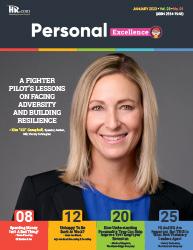



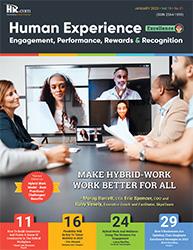
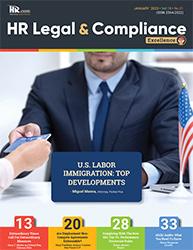

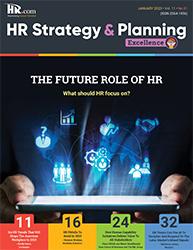
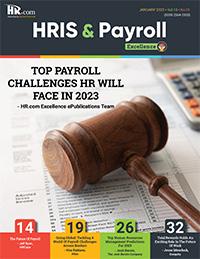

Like to submit an article? Use our online submission form or for more information go to www.hr.com/ExcellencePublications Publications 13 Targeted publications to reach Your Audience Informing, Educating, Enlightening and Assisting HR professionals in their personal and professional development, the Excellence series offers high-quality content through the publications!







 - Christopher Volk, Veteran Executive, Entrepreneur, Business Leader & Investor
- Christopher Volk, Veteran Executive, Entrepreneur, Business Leader & Investor

















 Dave Ulrich
Rensis Likert Professor, Ross School of Business, University of Michigan Partner, The RBL Group
Julie Winkle Giulioni Author, Virtual /Live Keynote Presenter, Inc.’s Top 100 Leadership Speakers
Dr. Beverly Kaye CEO, BevKaye&Co.
Dave Ulrich
Rensis Likert Professor, Ross School of Business, University of Michigan Partner, The RBL Group
Julie Winkle Giulioni Author, Virtual /Live Keynote Presenter, Inc.’s Top 100 Leadership Speakers
Dr. Beverly Kaye CEO, BevKaye&Co.




 By Dr. Beverly Kaye, BevKaye&Co.
By Dr. Beverly Kaye, BevKaye&Co.





































